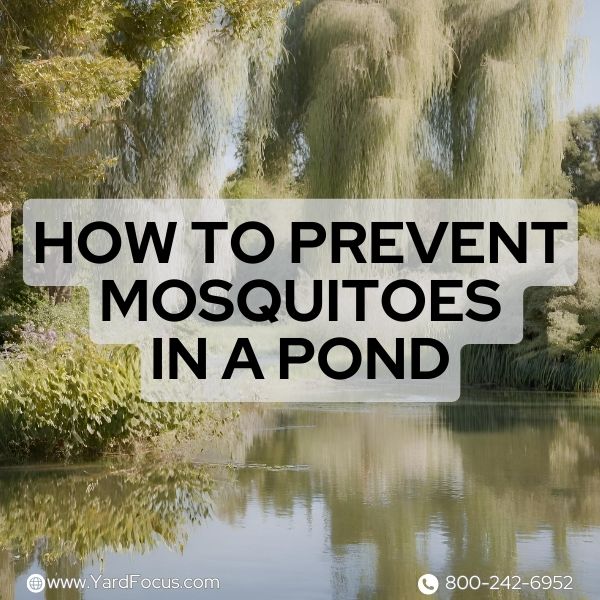
How to Prevent Mosquitoes in a Pond
Are bugs buzzing around and have you wondering how to prevent mosquitoes in a pond? It's a common issue that many pond owners face.
This blog will guide you through effective strategies to keep those pesky insects at bay, ensuring your water garden remains a serene retreat.
Keep reading for solutions.
Understanding the Mosquito Problem in Garden Ponds
Mosquitoes love water gardens but not for their beauty.
These pests find garden ponds perfect for laying their eggs, turning a peaceful spot into a breeding ground.
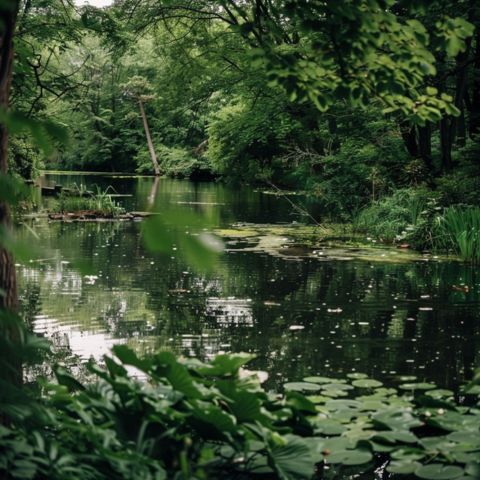
Even a small amount of stagnant water, as little as one ounce, can support dozens of mosquito larvae.
If left unchecked, your pond could hatch thousands of mosquitoes, potentially increasing the risk of mosquito-borne diseases.
The specific diseases vary by region, with some areas being at risk for conditions like malaria and dengue fever.
In some regions, county vector control services offer free mosquitofish (Gambusia affinis) or other larvivorous fish, which are known to consume mosquito larvae and pupae.
However, it's crucial to consult local environmental agencies before introducing them, as they can be invasive in certain ecosystems.
Introducing natural predators like dragonfly nymphs or installing features that promote water circulation can also help keep the mosquito population in check.
Employing larvicides containing Bacillus thuringiensis subspecies israelensis (Bti) is an effective strategy for targeting mosquito larvae while minimizing impact on non-target wildlife in your pond.
The Importance of Mosquito-Proofing Your Garden Pond
Mosquito-proofing your garden pond is crucial for several reasons.
These insects breed in stagnant water, turning your beautiful backyard feature into a prime spot for their eggs.
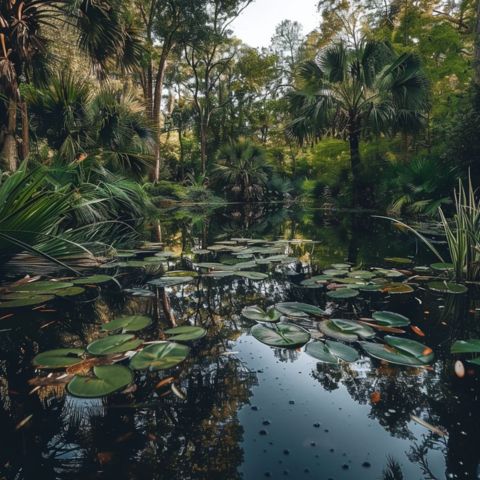
Not only do mosquitoes cause annoying bites, but they can also spread diseases like Zika and yellow fever.
Protecting your pond from these pests ensures the safety of you, your family, and local wildlife.
Taking steps to keep mosquitoes away helps maintain biodiversity in your garden as well.
Introducing mosquito-eating fish such as goldfish or using natural repellents can reduce the need for chemical pesticides that harm other creatures.
A balanced ecosystem supports frogs, dragonflies, and birds that rely on a healthy aquatic environment free of mosquito infestations.
Common Methods to Prevent Mosquitoes in Garden Ponds
To stop mosquitoes in your garden pond, you can try different methods like adding water features or choosing the right plants.
Keep reading to learn more about these exciting ways!
Using Moving Water Features
Adding a moving water feature, such as a waterfall or fountain, can help disrupt the water surface, making it less ideal for mosquitoes to lay eggs.
However, this method should be part of a broader integrated pest management strategy.
The constant movement disturbs the water, making it hard for mosquitoes to lay eggs.
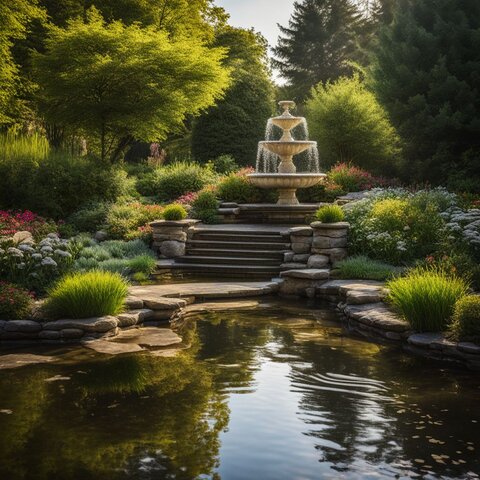
Aerator devices also play a big part in stirring up the pond’s surface.
These features not only reduce mosquito breeding but also add beauty and oxygen to your garden's ecosystem.
Next, consider letting nature lend a hand in controlling mosquitoes by promoting natural selection in your pond.
Letting Natural Selection Run Its Course
Moving water helps, but nature also offers a powerful way to fight mosquitoes.
By letting natural selection take its role, you can control these pests without harsh chemicals.
Introduce fish like mosquito fish and bluegill that eat mosquito larvae into your pond.
These fish are great at keeping the mosquito population down.
Bats and birds act as airborne guardians against mosquitoes too.
Installing birdhouses and bat boxes around your garden encourages these natural predators to visit.
They feast on adult mosquitoes, significantly reducing their numbers around your pond.
This approach not only controls mosquitoes but also adds life and beauty to your garden ecosystem.
Checking Your Water Chemicals
Regularly testing your pond's water can help ensure it remains inhospitable to mosquito larvae.
Maintaining balanced levels of pH, ammonia, nitrites, and nitrates is essential for the health of pond inhabitants and can indirectly affect mosquito breeding.
Use specific bacteria or insect growth regulators as larvicides. These kill mosquito larvae without hurting your pond life.
Next, consider adding mosquito-repellent plants around your garden pond.
Choosing Mosquito-Repellent Plants for Your Garden Pond
Mosquitoes can turn a peaceful pond into a breeding ground for pests.
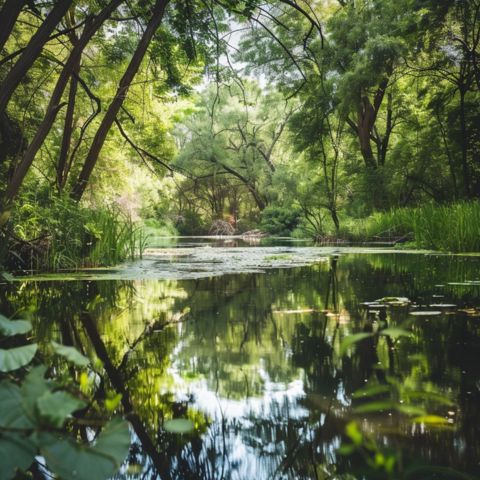
Planting mosquito-repellent plants around your pond keeps these biting insects away.
- Lemon balm acts as a strong mosquito repellent. Its fresh, lemony scent wards off mosquitoes and adds a refreshing aroma to your garden.
- Lavender is not just beautiful and calming; it also repels mosquitoes. The plant's potent fragrance makes the area around your pond unpleasant for mosquitoes.
- Citronella is famous for its insect - repelling properties. Growing citronella plants around your pond creates a natural barrier against mosquitoes.
- Marigolds contain pyrethrum, an ingredient used in many insecticides. Placing them near your pond can help keep mosquitos at bay.
- Catnip has been found to be more effective than DEET in repelling mosquitoes. Planting catnip can offer dual benefits: deterring mosquitoes and attracting cats.
While plants such as lemon balm, lavender, citronella, marigolds, and catnip are often cited for their mosquito-repellent properties, their effectiveness in open garden settings can vary.
These plants may contribute to a multi-faceted approach to mosquito control, but should not be solely relied upon.
Maintenance Tips to Prevent Mosquito Breeding in Garden Ponds
Keeping your garden pond free from mosquitoes is essential.
Here are some key steps you can take to prevent them from turning your pond into their breeding ground.
- Clean out excess vegetation and organic debris regularly. This reduces the places where mosquitoes can lay their eggs.
- Install deeper water features with steep slopes or vertical walls. Mosquito larvae prefer shallow, undisturbed water, so these designs discourage them.
- Add a fountain or waterfall to create water movement. Still water is a perfect environment for mosquito eggs and larvae, but moving water isn't.
- Use larvicides that contain Bacillus thuringiensis israelensis (Bti) or methoprene. These substances kill mosquito larvae without harming fish or plants.
- Check the pond for mosquito larvae often, especially after rain. Scoop any larvae you find out of the water with a fine net.
- Remove any containers around the pond that could collect rainwater and become additional breeding sites, like rain barrels or bird baths. Empty and clean these containers regularly.
- Plant mosquito - repellent plants around your pond area. Certain plants like citronella, lavender, and marigolds can help keep mosquitoes away.
- Encourage natural predators of mosquitoes to visit your garden. Birds, bats, dragonflies, and certain types of fish eat mosquitoes and their larvae.
Creating a Welcoming Environment for Mosquito Predators
Install bird feeders and insect hotels around your garden pond. This attracts birds and beneficial insects, such as purple martins, which eat mosquitoes.

Adding native water plants gives these predators a place to live and hunt.
Together, these steps add biodiversity and help control the mosquito population.
Incorporate features like shallow birdbaths or small ponds with flat rocks for butterflies and bees to perch on.
These additions encourage more predators to visit your garden, enhancing biological control over mosquitoes without using chemicals or bug spray.
How to Safely Eliminate Mosquitoes from Your Pond without Harming Fish
After setting up a pond that attracts mosquito predators, it's crucial to also directly address the mosquito issue without harming your aquatic friends.
Here are some effective ways to keep mosquitoes away from your garden pond while ensuring the safety of your fish.
- Consider introducing mosquito-eating fish such as mosquitofish (Gambusia affinis) or guppies, known for effectively consuming mosquito larvae. Note that while goldfish and koi may consume mosquito larvae, their efficiency varies, and they might contribute to water quality issues in smaller ponds. Always consult with a local environmental agency or a pond specialist to ensure the chosen species is suitable for your pond's ecosystem.
- Apply larvicides carefully as part of an integrated pest management strategy. Opt for environmentally friendly products, such as mosquito dunks containing Bacillus thuringiensis israelensis (Bti), which specifically target mosquito larvae without affecting fish, plants, or other wildlife. Carefully following label instructions is crucial for effective and safe use.
- Utilize eco-friendly insect growth regulators (IGRs) - Choose products that specifically target mosquito larvae and prevent them from maturing into adults. Select IGRs that are safe for use in aquatic environments to avoid harming non-target species. Always follow the label instructions for safe application.
- Add a fountain or waterfall - Moving water discourages mosquitoes from laying eggs and helps oxygenate the water for your fish.
- Remove excess vegetation - Trim any pond plants regularly to eliminate hiding spots for mosquitoes and reduce areas where they can lay eggs.
- Clean the pond regularly - Skim the surface to remove debris, and clean filters often to prevent stagnant water, which is a breeding ground for mosquitoes.
- Check for standing water nearby – Eliminate any additional breeding sites around your pond to ensure mosquitoes don’t have alternative places to lay eggs.
FAQs
What can I do to stop mosquitoes from breeding in my pond?
To prevent mosquitoes from using your pond as a breeding ground, add fish that eat larvae and regularly clean the water to get rid of fly larvae and fungus gnats that attract them.
Can pest control help with mosquito problems in ponds?
Yes, professional exterminators know how to control pests by targeting both adult mosquitoes and wrigglers; this stops them from biting you or spreading diseases like dog heartworm.
How often should I check my pond for mosquito activity?
Check your pond at least once a week for signs of mosquito larvae, known as wrigglers, especially during warm months when they breed more actively.
Are there natural ways to keep mosquitoes away from my pond?
Indeed! Introducing plants around your pond that naturally repel mosquitoes or installing a fountain to keep the water moving can greatly reduce their presence since they prefer still water for laying eggs.
Conclusion
Learning how to prevent mosquitoes in a pond doesn't have to be tough.
Use moving water, natural predators, and plant choices smartly. Always check for larvae and eliminate standing water spots.
Remember, creating a healthy ecosystem in your pond can help control mosquitoes naturally. With these steps, enjoy a peaceful, bite-free garden space!

